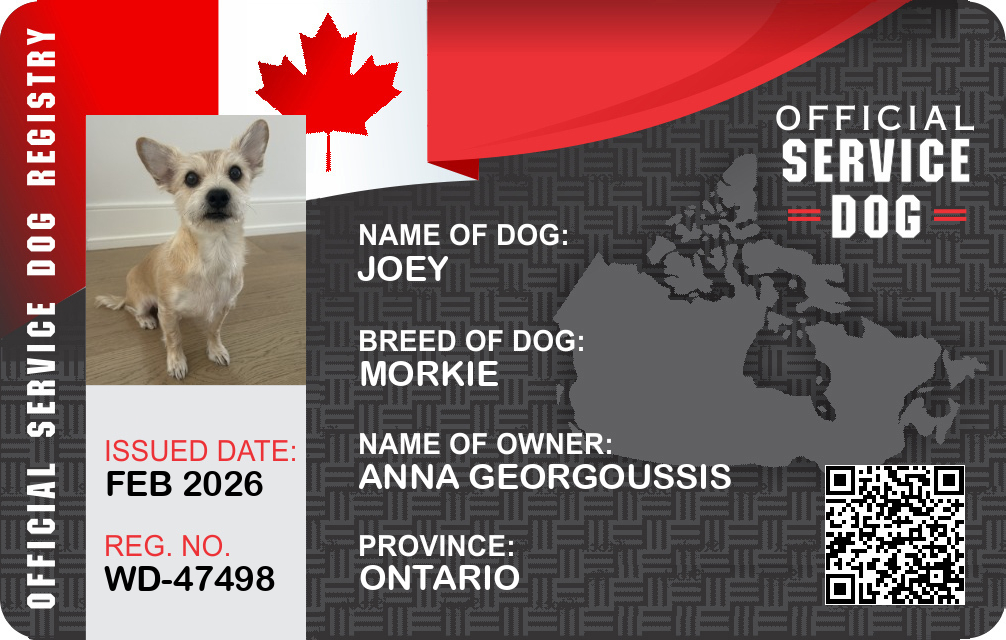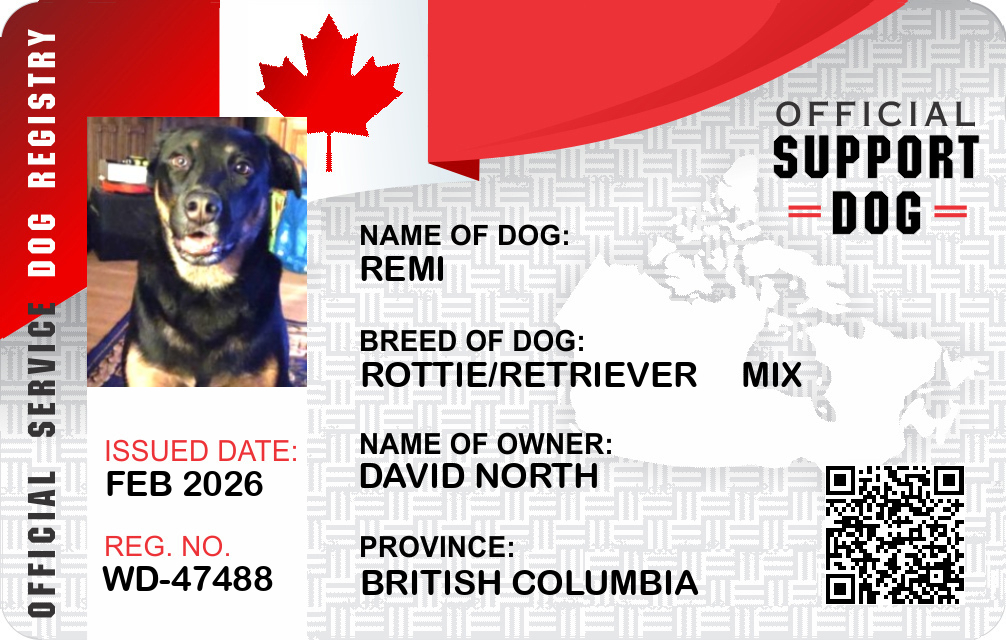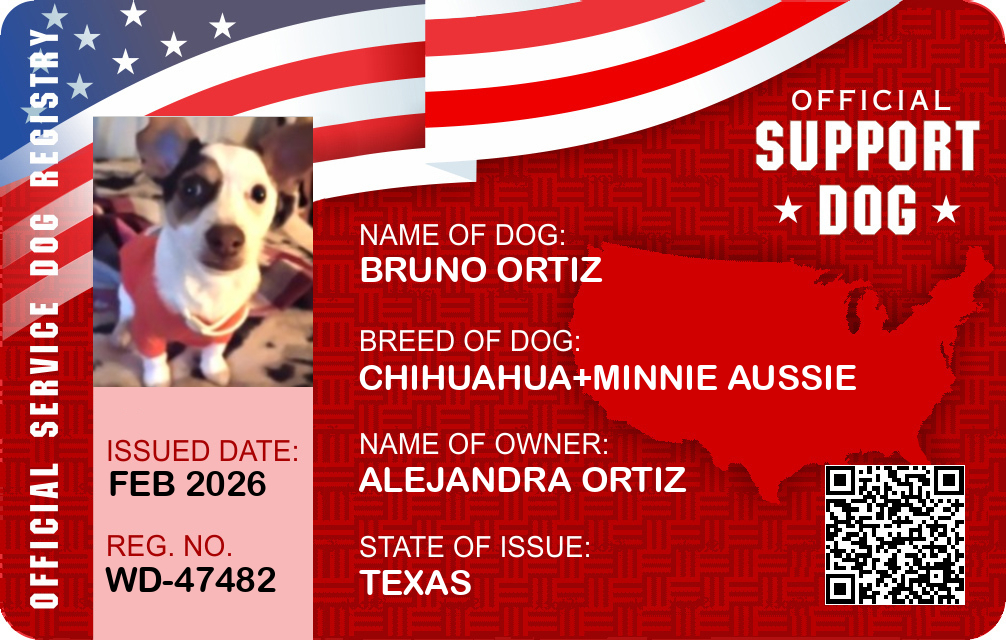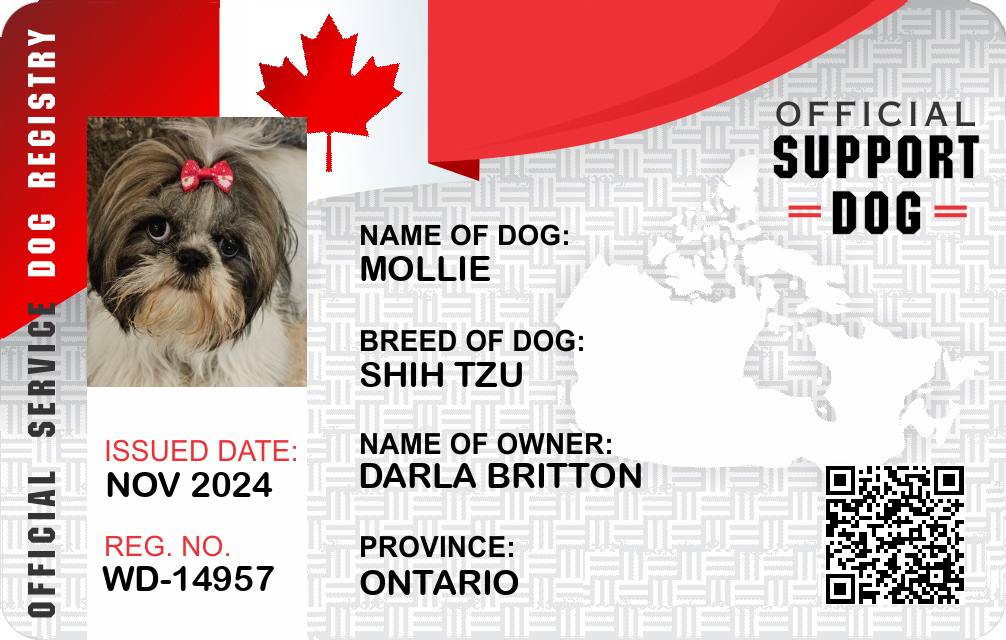South Dakota Service Dog Laws
Get Your Documents
Example State Cards


In recent years, service dogs have become an essential part of life for individuals with certain disabilities. As these animals provide crucial assistance, understanding the legal frameworks that govern their use is critical. In South Dakota, as elsewhere in the United States, service dog laws are shaped by a mix of federal and state-specific statutes that regulate how these animals are defined, the rights of their handlers, and what is legally expected of those who might encounter them.
Overview of Service Dog and Legal Definitions in South Dakota
What is a Service Dog?
A service dog is defined in both federal and state law as a dog that is trained to perform specific tasks for the benefit of an individual with a disability. These disabilities can include physical, sensory, psychiatric, intellectual, or other mental disabilities. The task performed by the service dog must be directly related to the individual’s disability, distinguishing them from pets or emotional support animals.
In South Dakota, this definition aligns with that of the Americans with Disabilities Act (ADA), which mandates that service dogs are not pets. The training involved in preparing a service dog can be extensive and customized to the needs of the handler. Unlike therapy or emotional support animals, which provide comfort and companionship, service dogs perform work or tasks that directly mitigate the disabling condition.
How Service Dogs Differ from Other Types of Assistance Animals
It’s important to distinguish service dogs from other types of assistance animals. While service dogs perform specific tasks, emotional support animals provide comfort through companionship but are not trained to perform specific tasks that assist individuals with disabilities. Another category is therapy animals that are trained to provide psychological support in therapeutic settings.
South Dakota law mirrors federal regulations in acknowledging these distinctions. Emotional support and therapy animals do not possess the same legal rights to public access and housing as service dogs. Only service dogs, due to their specialized training, can accompany their handlers into most public and private spaces.
Key Federal Laws Affecting Service Dogs (e.g., ADA, FHA, ACAA)
Several key federal laws have implications for service dogs. The ADA is perhaps the most critical, ensuring that individuals with disabilities have equal access to public accommodations. This law requires that businesses, nonprofits, and state and local governments allow service dogs to accompany people with disabilities in places open to the public.
The Fair Housing Act (FHA) provides another layer of protection, prohibiting discrimination in the sale or rental of housing and ensuring that reasonable accommodations are made for service dogs.
Additionally, the Air Carrier Access Act (ACAA) protects the rights of individuals with disabilities in air travel, allowing them to fly with their service dogs, although recent updates have tightened requirements for when service animals can accompany their handlers in the cabin.
State-Specific Service Dog Laws in South Dakota
Housing Rights and Responsibilities
Under South Dakota law, housing providers must accommodate individuals with disabilities who use service dogs. This includes not imposing “pet” fees or deposits, as a service dog is not considered a pet. Housing providers may request documentation to establish the need for a service dog, but they cannot ask for specifics about the individual’s disability.
Individuals in South Dakota seeking housing accommodations should prepare to provide verification from a medical or mental health professional that a service dog is necessary for their disability.
Public Access and Accommodation
For public access, South Dakota follows the ADA’s provisions, which allow service dogs to accompany their handlers in all areas of public accommodation. These include restaurants, stores, hotels, and theaters, among others. Service dogs must be under control at all times, and businesses may ask two questions to verify the legitimacy of the service dog: (1) Is the service animal required because of a disability? and (2) What work or task has the dog been trained to perform?
Transportation and Travel Rules
Transportation, whether public or private, must accommodate service dogs. In South Dakota, as elsewhere, service dogs are permitted on buses, trains, and other modes of public transit without additional fees. Airlines, operating under the ACAA, have more specific guidelines, requiring advance notice and allowing for certain documentation.
Employment and Workplace Considerations
Employers in South Dakota must accommodate service dogs in the workplace under the ADA’s mandate for reasonable disability accommodations. A discussion between the employer and employee is encouraged to ensure the service dog does not disrupt operations while the needs of the employee are met. Employers cannot make inquiries about the specifics of the disability beyond understanding the function of the service dog.
Documentation, Requirements, and Processes in South Dakota
Service Dog Documentation and Who Can Issue It
In South Dakota, there is no formal certification required for a dog to be classified as a service dog. However, handlers must be prepared to articulate the tasks the dog performs related to their disability. While the ADA limits the questions that can be asked, documentation from a medical or mental health professional confirming the need for a service dog can be critical, especially in housing and employment scenarios.
Landlord, Business, and Provider Verification Rules
When dealing with landlords, businesses, or service providers in South Dakota, documentation should highlight that the dog is required due to a disability and is trained to perform specific tasks. These entities cannot require state or federal certification as proof, nor can they demand personal medical records. It is advisable, though not mandatory, for handlers to carry a letter from a healthcare provider attesting to their need for a service animal.
Rights, Limitations, and Legal Risks
Rights Service Dog Handlers Have in South Dakota
Service dog handlers in South Dakota are entitled to equal treatment under the law. This includes the right to live, travel, and work with their service dog without incurring additional fees or encountering discrimination. These rights are protected under various federal and state laws, ensuring individuals with disabilities have equal opportunities.
Limits on Service Dog Protections and Common Restrictions
While rights are robust, they are not limitless. Service dogs must behave appropriately in public, and handlers are responsible for any damage caused by their service dog. Businesses can ask a handler to remove their dog if it is out of control or not housebroken, although they still must offer goods or services to the person without the animal. Areas such as sterile hospital environments or private clubs may impose further restrictions.
Penalties for Fraud or Misrepresentation
Misrepresenting a pet as a service dog is a legal risk in South Dakota. Fraudulent representation undermines the legitimacy of service dogs and can lead to fines or other penalties. Such misrepresentation is not only unethical but harmful to individuals who rely on real service dogs.
Practical Guidance for Service Dog Handlers in South Dakota
How to Qualify for a Service Dog Legitimately
To legitimately qualify for a service dog in South Dakota, one must have a documented disability and require assistance with specific tasks related to that disability. Working with a licensed healthcare professional to discuss the benefits of a service dog is crucial, as they can provide the necessary documentation to support the need for the animal.
How to Talk to Landlords, Airlines, and Employers
When engaging with landlords, airlines, and employers, clarity and documentation are key. It’s advisable to communicate clearly how the service dog assists with managing a disability. Having a letter from a healthcare provider can preempt many challenges and facilitate smoother interactions.
Summary of Service Dog Laws in South Dakota
Key Rights and Responsibilities for Handlers in South Dakota:
- Service dogs are permitted in all public areas and housing without extra fees.
- Handlers must have documentation to verify the need but are not required to disclose their specific disability.
- Service dogs must be controlled and well-behaved in public spaces.
- Employers must provide reasonable accommodations for service dogs.
- Misrepresenting a pet as a service dog can lead to legal penalties.
By adhering to these guidelines, service dog handlers in South Dakota can effectively navigate their rights and responsibilities while ensuring they and their service animals are welcomed members of the community.
Get Your Documents
Example State Cards













